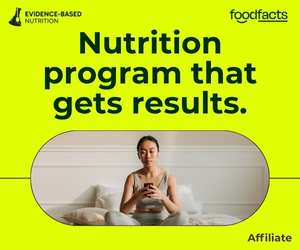
Debunking the grain-depression myth: what you really need to know





Coral Red: Mostly False
Orange: Misleading
Yellow: Mostly True
Green: True
Learn more about our fact-checking policies
In a reel posted on June 1st, 2024, Candi Frazier, aka theprimalbod says this: “Those grains are depression foods. That’s what the peasants ate. That is what people ate when there was no food around. Also, it makes you depressed. You’ve heard of grain brain. It causes inflammation in the brain. Those foods are not foods for us.”
Frazier’s statements about grains might sound convincing, but they deserve a closer look. Are grains really sabotaging your mental health, or is this just another example of oversimplified nutrition myths?
Let’s break it down.
Grains are a vital part of the human diet for most people, except for those with specific health conditions like celiac disease. There is a difference between refined grains and whole grains, and whole grains are consistently associated with improved health outcomes. Whole grains are high in fibre, nutrients, and beneficial compounds.

The Gluten and Mood Study: What It Really Says
Social media influencer Candi Frazier, who goes by the handle @theprimalbod on Instagram, claims that grains are "depression foods." According to Frazier, consuming grains can lead to brain inflammation and, ultimately, depression.
To back up her claim, Frazier shows a study published in the journal Nutrients titled “Mood Disorders and Gluten: It’s Not All in Your Mind! A Systematic Review with Meta-Analysis.” She uses this study to generalise that grains are universally harmful and can cause depression. However, the study doesn’t support this sweeping conclusion.
The research focuses on individuals with gluten-related disorders like Non-Celiac Gluten Sensitivity (NCGS). These are people who already have a sensitivity to gluten, a protein found in certain grains: wheat, barley, spelt, and rye. The study found that a gluten-free diet improved mood in people with these specific conditions but didn’t show any significant effect on those without such sensitivities.
Don’t Generalise Grains, They’re Not All Created Equal
Another issue with Frazier's claims is her blanket condemnation of all grains. Not all grains are created equal, and lumping them together misses a crucial distinction: whole grains versus refined grains.
Whole grains like quinoa, oats, and brown rice are packed with nutrients and fibre, which are beneficial for everything from heart health to digestion. On the other hand, refined grains, which are stripped of these nutrients, are not linked to the same health benefits.
Bakovic adds, “Grains are a generalized term. There are many types of grains and some that are more processed than others. Whole grain foods such as quinoa, farro, black/red/brown rice, oats, and whole wheat bread can actually provide health benefits if consumed in moderation and in appropriate portions.”
The Controversy of “Grain Brain”
Frazier also adds the concept of “grain brain,” suggesting that grains cause inflammation in the brain. This idea is rooted in a controversial hypothesis that has been largely debunked in the scientific community. While some studies suggest that gluten may cause inflammation in individuals who are sensitive to it, there is no solid evidence that grains, in general, have this effect on the broader population.
The term “grain brain” promotes a fear-based narrative that is not supported by the majority of scientific research. Bakovic adds, “The additional terminology of ‘grain brain’ also promotes that unhealthy relationship, and is untrue as based on scientific research and evidence-based practices. Food is not the enemy, and the ultimate goal would be to have a positive relationship with food and be able to eat intuitively and mindfully without having obsessive thoughts or negative associations.”
Grains: From Peasant Food to Nutritional Staple
Frazier further claims that “grains are what the peasants ate when there was no food around,” implying that grains are nutritionally inferior or a last resort. This statement is not only historically inaccurate but also misleading. Grains have been a staple in diets worldwide due to their nutritional value, ease of storage, and versatility. They’re far from being a food of last resort—in many cultures, they’re the foundation of a balanced diet.
The Reality of Grains in a Balanced Diet
So, should you be worried about grains in your diet? For most people, the answer is a resounding no.
Unless you have a specific medical condition like celiac disease or gluten sensitivity, grains—especially whole grains—are a valuable part of a balanced diet. They provide essential nutrients, fibre, and energy that support overall health and well-being.
“Whole grains are recommended by dietary guidelines as part of a healthy diet,” Bakovic reminds us. “The consumption of whole grains is a source of complex carbohydrates, which are a fuel source for the brain and provide energy to fuel muscles and bodies properly during physical activity.”
Trust the Science
Social media influencers like Candi Frazier can make compelling claims, especially when they are presented with confidence and backed by selective citations. Her claims about grains causing depression and brain inflammation might sound convincing, but when we consider the scientific evidence, they don’t hold true.
Bakovic advises, “Any recommendations or claims by individuals who are not healthcare professionals or Registered Dietitian Nutritionists (RDN) should be taken with a grain of salt. There is a lot of misleading and confusing nutrition information available on the internet and social media which makes it difficult for the general public to diffuse what is true and relevant and what is not.”
In the end, a balanced, evidence-based approach to nutrition is your best bet for long-term health and well-being. Grains, particularly whole grains, can and should be part of that approach for most people.
“Although the study was a systematic review (strong evidence combining several clinical trials), there was no association found for mood disorders in individuals who do not already have a gluten allergy or intolerance. To term that gluten or grains are a depression food would be inappropriate, and most definitely for the majority of the population who can safely tolerate grains and other gluten-containing goods.”
Stand Against Nutrition Misinformation
Misinformation is a growing threat to our health and planet. At foodfacts.org, we're dedicated to exposing the truth behind misleading food narratives. But we can't do it without your support.
Sources
Aune, D. et al. (2016). Whole grain consumption and risk of cardiovascular disease, cancer, and all cause and cause specific mortality: systematic review and dose-response meta-analysis of prospective studies. https://pubmed.ncbi.nlm.nih.gov/27301975/
Khan, J. et al. (2022). Overview of the Composition of Whole Grains' Phenolic Acids and Dietary Fibre and Their Effect on Chronic Non-Communicable Diseases. https://pubmed.ncbi.nlm.nih.gov/35270737/
Tosh, S.M. & Bordenave, M. (2020). Emerging science on benefits of whole grain oat and barley and their soluble dietary fibers for heart health, glycemic response, and gut microbiota. https://pubmed.ncbi.nlm.nih.gov/32728756/



foodfacts.org is an independent non-profit fact-checking platform dedicated to exposing misinformation in the food industry. We provide transparent, science-based insights on nutrition, health, and environmental impacts, empowering consumers to make informed choices for a healthier society and planet.

Was this article helpful?

















.svg)
